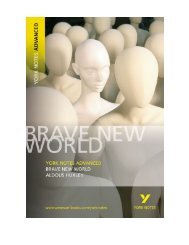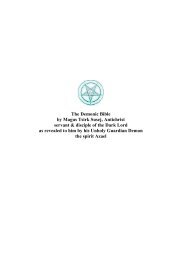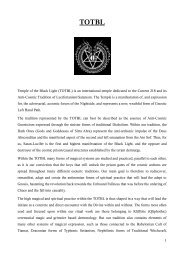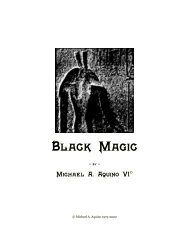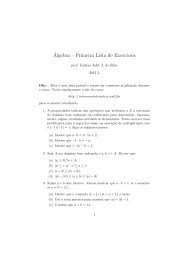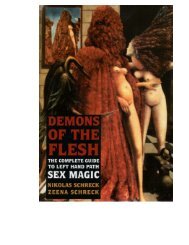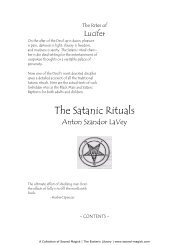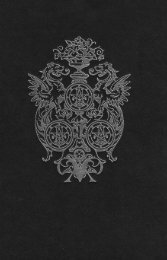Satanism Today - An Encyclopedia of Religion, Folklore and Popular ...
Satanism Today - An Encyclopedia of Religion, Folklore and Popular ...
Satanism Today - An Encyclopedia of Religion, Folklore and Popular ...
You also want an ePaper? Increase the reach of your titles
YUMPU automatically turns print PDFs into web optimized ePapers that Google loves.
Judgment <strong>of</strong> the Dead 139<br />
<strong>and</strong> possessions; those who hung by their ears<br />
listened to empty <strong>and</strong> vain speech <strong>and</strong> did not<br />
listen to the Torah; those who hung by their<br />
tongues spoke foolishly <strong>and</strong> sl<strong>and</strong>erously;<br />
those who hung by their h<strong>and</strong>s robbed <strong>and</strong><br />
murdered their neighbors. The women who<br />
hung by their hair <strong>and</strong> breasts uncovered<br />
them in the presence <strong>of</strong> young men in order<br />
to seduce them (Cohn-Sherbok 1987, p. 29).<br />
At later points in this same account, sinners<br />
were punished by scorpions <strong>and</strong> by being lashed<br />
with fiery chains by angels <strong>of</strong> destruction. Heaven<br />
is described with the same kind <strong>of</strong> vividness,<br />
although its pleasures are far more restrained than<br />
the tortures <strong>of</strong> hell.<br />
See also Demons; Lilith; Sheol<br />
For Further Reading:<br />
Cohn-Sherbok, Daniel. “Death <strong>and</strong> Immortality in<br />
the Jewish Tradition.” In Paul Badham <strong>and</strong><br />
Linda Badham, eds. Death <strong>and</strong> Immortality in<br />
the <strong>Religion</strong>s <strong>of</strong> the World. New York: Paragon<br />
House, 1987, 24–36.<br />
Eliade, Mircea, ed. <strong>Encyclopedia</strong> <strong>of</strong> <strong>Religion</strong>. New<br />
York: Macmillan, 1987.<br />
Goldenberg, Robert. “Bound Up in the Bond <strong>of</strong><br />
Life: Death <strong>and</strong> Afterlife in the Jewish<br />
Tradition.” In Hiroshi Obayashi, ed. Death <strong>and</strong><br />
Afterlife: Perspectives <strong>of</strong> World <strong>Religion</strong>s.<br />
Westport, CT: Greenwood Press, 1992, 97–108.<br />
Margolies, Morris B. A Gathering <strong>of</strong> <strong>An</strong>gels: <strong>An</strong>gels<br />
in Jewish Life <strong>and</strong> Literature. New York:<br />
Ballantine Books, 1994.<br />
Mendenhall, George E. “From Witchcraft to Justice:<br />
Death <strong>and</strong> Afterlife in the Old Testament.” In<br />
Hiroshi Obayashi, ed. Death <strong>and</strong> Afterlife:<br />
Perspectives <strong>of</strong> World <strong>Religion</strong>s. Westport, CT:<br />
Greenwood Press, 1992.<br />
Nielsen, Niels C., Jr., et al. <strong>Religion</strong>s <strong>of</strong> the World.<br />
New York: St. Martin’s Press, 1983.<br />
Pagels, Elaine. The Origin <strong>of</strong> Satan. New York:<br />
Vintage Books, 1995.<br />
West, James King. Introduction to the Old Testament.<br />
New York: Macmillan, 1981.<br />
Judgment <strong>of</strong> the Dead<br />
The notion <strong>of</strong> the judgment <strong>of</strong> the dead has infernal<br />
associations cross-culturally. In the Christian<br />
tradition, the unsaved at Judgment Day are<br />
thought <strong>of</strong> as being given over to demons who drag<br />
them <strong>of</strong>f to hell. The popular conception <strong>of</strong> hell is<br />
that Satan’s minions have ongoing employment in<br />
the form <strong>of</strong> torturing the damned in a kind <strong>of</strong><br />
underground smelting factory. This contrasts with<br />
the view <strong>of</strong> early Christianity in which stern, righteous<br />
angels, rather than devils, were so employed.<br />
Deceased evildoers are also tormented by demons<br />
in Hindu <strong>and</strong> Buddhist hell worlds, comparable to<br />
the torments <strong>of</strong> Western hells.<br />
Not all cultures differentiate between the afterlife<br />
fates <strong>of</strong> morally good <strong>and</strong> morally bad individuals.<br />
In traditions in which such a distinction is<br />
made, the mechanism by which good souls are<br />
sent to happy states <strong>and</strong> evil souls directed to<br />
unhappy states can take place in different ways.<br />
Sometimes this dichotomization occurs automatically,<br />
as in South Asian traditions in which the net<br />
effect <strong>of</strong> one’s accumulated karma propels the<br />
departed soul to reincarnate in pleasant or<br />
unpleasant circumstances. Similarly the religious<br />
notion <strong>of</strong> metempsychosis, the process by which<br />
souls enter a new body in the Pythagorean<br />
doctrine as well as in ancient Druid <strong>and</strong> Irish literature,<br />
is related to the belief in immortality <strong>and</strong><br />
indirectly implies a judgment on the fate <strong>of</strong> the<br />
souls. In Zoroastrianism <strong>and</strong> in certain other religions,<br />
the deceased must cross a bridge, which<br />
presents an easy passage for good souls but which<br />
is difficult for evil souls. Here, again, the mechanism<br />
by which this occurs is impersonal. As the<br />
name <strong>of</strong> the present entry, Judgment <strong>of</strong> the Dead,<br />
implies, the determination <strong>of</strong> the fate <strong>of</strong> the dead<br />
is <strong>of</strong>ten portrayed in more personal terms, in<br />
which the deceased is brought into a kind <strong>of</strong><br />
otherworldly courtroom to have judgment passed<br />
on her or his life by a divine or semidivine being.<br />
Sources on the notion <strong>of</strong> a judgment <strong>of</strong> the<br />
dead are rather meager for Mesopotamian civilization.<br />
In ancient Egypt, tomb inscriptions indirectly<br />
refer to an afterlife judgment during the Old<br />
Kingdom. Religious texts in the Middle Kingdom<br />
(e.g., Instruction for Merikare) are explicit about an<br />
afterlife judgment for sinners, whose sins will be<br />
laid beside them in a heap. In another Egyptian<br />
religious text, the Book <strong>of</strong> the Dead, one finds<br />
magical spells for protecting oneself from divine<br />
judgment. According to this book, the deceased<br />
recite a “negative confession” in which they must<br />
declare that they have not sinned during life. The



